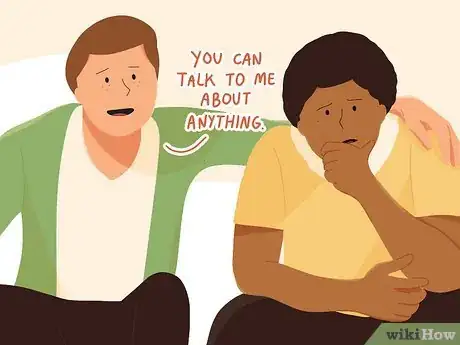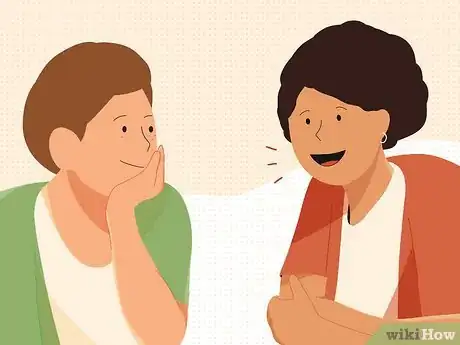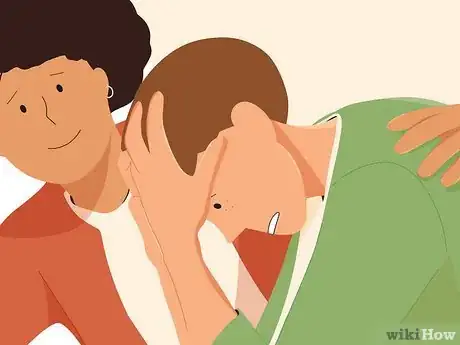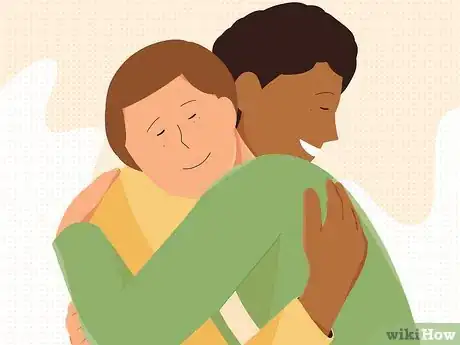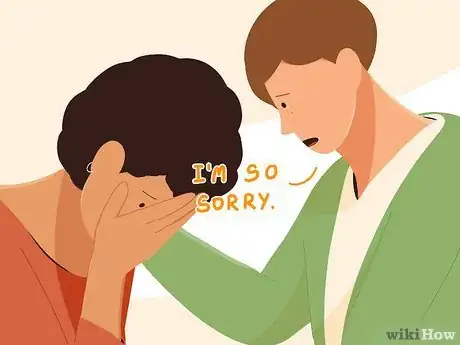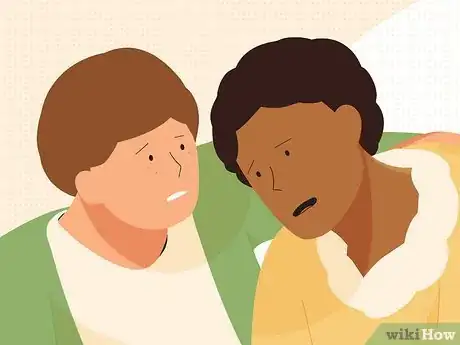This article was co-authored by Christy Irvine, PhD and by wikiHow staff writer, Madeleine Criglow. Dr. Christy Irvine is a Licensed Clinical Psychologist and the owner of her private practice out of Portland, Oregon. With over 10 years of experience, she specializes in individual and couples therapy using various techniques including Emotionally Focused Therapy (EFT), Acceptance and Commitment Therapy (ACT), Interpersonal-Process Therapy, and Cognitive Processing Therapy (CPT). Dr. Irvine holds a B.A. in Psychology from Whitman College and a Ph.D. in Clinical Psychology from The University of Connecticut.
There are 8 references cited in this article, which can be found at the bottom of the page.
This article has been viewed 14,214 times.
Friends are great because you can relax and be yourself around them. That may sound simple, but it can be hard to know how to behave around your friends sometimes. There are a lot of ways you can behave with your friends, like being there for them when they need you, accepting their weird quirks, and laughing with them about hilarious or embarrassing moments you both experience. The important thing is to try to always be a good friend. If you're looking for some advice on how to behave with your friends, this article is here to help.
Steps
Be yourself around your friends.
-
Your friends need to know the real you to form a genuine friendship. Keep your head held high and be open about your interests. Play your favorite music when you're driving around together in your car and talk about your obsession with basketball. Whatever your passions may be, openly share them. It helps you get closer to your friends, and it will make your friends more comfortable sharing who they are with you.[1] X Expert Source

Licensed Clinical Psychologist Expert Interview. 9 April 2021. [2] X Research source- If you're feeling insecure around new friends, that's completely normal. Try faking confidence by adopting confident body language. Stand up straight and keep your shoulders back. You'll be surprised at how much this helps!
- Try not to pretend to like something just because your friend likes it. People can usually see through this, and it prevents you from sharing who you really are.
Share your sense of humor.
-
Crack some jokes and be silly! One of the best parts of friendship is relaxing and having fun. Do impressions of your favorite actors, sing along to the radio, and don't be afraid to let loose a little bit. Letting go helps your friends do the same, and it will help you both feel more comfortable.[3] X Research source
- You don't have to force it. As you get to know new friends, your sense of humor will come out naturally.
Celebrate your friends' success.
-
Be happy for your friends when things are going well for them. Though it can be tough to avoid comparing yourself to your friends, remember that you want your friends to be happy. Part of that is being genuinely excited for them when good things happen. If your friend gets a promotion or an academic award, congratulate them. Tell them that you are proud of them and offer to celebrate with them.[4] X Research source
- Say something like, "I'm so happy for you! You're so talented and you work so hard. I'm lucky to have a friend like you!"
Support your friends in their time of need.
-
Provide encouragement when your friends go through tough times. Maybe a friend of yours' parents is going through a divorce or they're really struggling in school. Help your friends get through a difficult time by showing up for them. Take them out to ice cream, make them a mix CD, or spend extra time hanging out with them at their house. This shows that you care about them and want to help them feel better![5] X Research source
- If your friend is going through a bad breakup, invite them over for a movie night at your house. Say something like, "I'm sorry things have been hard lately. Would you want to come over for a pizza and movie night?"
- Simply letting a friend know that you're there for them can be enough sometimes. Tell them, "I just want you to know that I'm always here for you. You can talk to me about anything."
Be a good listener.
-
Take an active interest in what your friends have to say. Listen to them when they share stories about their day and ask them questions about their interests and hobbies. In conversations, try paraphrasing what they said in your own words to make sure you understood them, and make eye contact with them while they speak. This shows your friend that you really care about them and want to get to know them more.[6] X Research source
- Put your phone away when your friend is speaking! It can really hurt to open up to your friend about something only to find that they've been staring at their phone the whole time.
Ask your friends questions.
-
This shows you want to get to know them even more. If your friend tries out for the soccer team at school, ask her how tryouts went. Maybe your friend is applying to the college of their dreams. Ask them what they plan on writing their application essay on. Asking questions is a simple but meaningful way to show your friend that you care, and it's a great way to deepen an already close friendship.[7] X Expert Source

Licensed Clinical Psychologist Expert Interview. 9 April 2021. [8] X Research source- If your friend is trying to make their first student film, ask them something like, "How is the script coming along?"
Don't be afraid to be vulnerable.
-
Trust them enough to share your weaknesses. It's hard to really get to know someone when they're always trying to prove how awesome they are. If you've got some interests you think are nerdy (everyone does), share them. When something embarrassing happens, confide in your friend and even laugh about it with them.[9] X Expert Source

Licensed Clinical Psychologist Expert Interview. 9 April 2021. This step may take some time, but it will deepen your friendship and help you both feel more comfortable.[10] X Research source- Let's say you discovered toilet paper on the bottom of your shoe right in front of your crush. Rather than hiding the moment like a dark secret, tell your friends so you can eventually laugh about it and let it go. They may share a story in return.
Try not to judge your friends.
-
Everyone has shortcomings, including your friends. Avoid holding their flaws against them. Maybe your friend always forgets their keys at home. Part of being a good friend is accepting someone for who they are. Help them remember their keys when you can, or reassure them when it happens. It will help them relax around you and hopefully make them forgiving about your flaws (you know you've got them, too!).[11] X Research source
- This doesn't mean you should let them treat you poorly. If your friends' flaws include putting you down, that needs to be addressed. A good friend doesn't make you feel bad about yourself!
Apologize when you mess up.
-
Everyone makes mistakes with friends sometimes. Maybe you forgot to give them a gift on their birthday or snapped at them when you were really stressed out in class. Whatever the mistake may be, own up to it and apologize. Avoid blaming it on your friend or any other circumstances and take responsibility for your actions. People are much more willing to forgive when you are honest and vulnerable enough to make a genuine apology.[12] X Research source
- Say something like, "I'm so sorry I was moody in class yesterday. I was feeling stressed, but I should've never taken that out on you."
Resolve conflict when it happens.
-
Talk through disagreements when they arise. Even the best of friends get into arguments sometimes. When you run into conflict with a friend, talk through it calmly and rationally. Listen to your friend's point of view and share yours (respectfully). Say that you're sorry if you had any part in the conflict, and try to come up with a solution that makes you both happy.[13] X Expert Source

Licensed Clinical Psychologist Expert Interview. 9 April 2021. If your friend is the one that messed up, consider forgiving them if they give you a genuine apology.[14] X Research source- If your friend really hurts your feelings, it's okay if you're not sure that you can forgive them. Sometimes the best way to resolve a conflict is to take some time apart to think about it.
You Might Also Like


 How to Make Friends in Your 20s after College
How to Make Friends in Your 20s after College









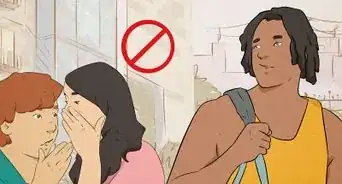

References
- ↑ Christy Irvine, PhD. Licensed Clinical Psychologist. Expert Interview. 9 April 2021.
- ↑ https://www.psychologytoday.com/us/blog/lifetime-connections/201503/the-13-essential-traits-good-friends
- ↑ https://www.psychologytoday.com/us/blog/lifetime-connections/201503/the-13-essential-traits-good-friends
- ↑ https://psychcentral.com/lib/the-care-and-maintenance-of-friendship
- ↑ https://www.psychologytoday.com/us/blog/lifetime-connections/201503/the-13-essential-traits-good-friends
- ↑ https://www.nytimes.com/guides/smarterliving/be-a-better-listener
- ↑ Christy Irvine, PhD. Licensed Clinical Psychologist. Expert Interview. 9 April 2021.
- ↑ https://www.nytimes.com/guides/smarterliving/be-a-better-listener
- ↑ Christy Irvine, PhD. Licensed Clinical Psychologist. Expert Interview. 9 April 2021.
- ↑ https://www.psychologytoday.com/us/blog/emotional-mastery/202008/how-be-more-vulnerable-and-authentic
- ↑ https://psychcentral.com/blog/emotionally-sensitive/2012/07/letting-go-of-judgments
- ↑ https://www.girlshealth.gov/relationships/friendships/index.html
- ↑ Christy Irvine, PhD. Licensed Clinical Psychologist. Expert Interview. 9 April 2021.
- ↑ https://www.girlshealth.gov/relationships/conflict/index.html
About This Article




